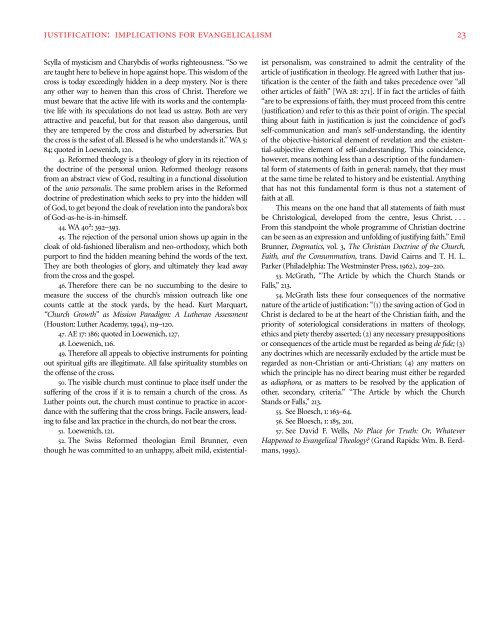05-4 Theology of the..
05-4 Theology of the..
05-4 Theology of the..
Create successful ePaper yourself
Turn your PDF publications into a flip-book with our unique Google optimized e-Paper software.
JUSTIFICATION: IMPLICATIONS FOR EVANGELICALISM 23<br />
Scylla <strong>of</strong> mysticism and Charybdis <strong>of</strong> works righteousness. “So we<br />
are taught here to believe in hope against hope. This wisdom <strong>of</strong> <strong>the</strong><br />
cross is today exceedingly hidden in a deep mystery. Nor is <strong>the</strong>re<br />
any o<strong>the</strong>r way to heaven than this cross <strong>of</strong> Christ. Therefore we<br />
must beware that <strong>the</strong> active life with its works and <strong>the</strong> contemplative<br />
life with its speculations do not lead us astray. Both are very<br />
attractive and peaceful, but for that reason also dangerous, until<br />
<strong>the</strong>y are tempered by <strong>the</strong> cross and disturbed by adversaries. But<br />
<strong>the</strong> cross is <strong>the</strong> safest <strong>of</strong> all. Blessed is he who understands it.” WA 5:<br />
84; quoted in Loewenich, 120.<br />
43. Reformed <strong>the</strong>ology is a <strong>the</strong>ology <strong>of</strong> glory in its rejection <strong>of</strong><br />
<strong>the</strong> doctrine <strong>of</strong> <strong>the</strong> personal union. Reformed <strong>the</strong>ology reasons<br />
from an abstract view <strong>of</strong> God, resulting in a functional dissolution<br />
<strong>of</strong> <strong>the</strong> unio personalis. The same problem arises in <strong>the</strong> Reformed<br />
doctrine <strong>of</strong> predestination which seeks to pry into <strong>the</strong> hidden will<br />
<strong>of</strong> God, to get beyond <strong>the</strong> cloak <strong>of</strong> revelation into <strong>the</strong> pandora’s box<br />
<strong>of</strong> God-as-he-is-in-himself.<br />
44. WA 40 2 : 392–393.<br />
45. The rejection <strong>of</strong> <strong>the</strong> personal union shows up again in <strong>the</strong><br />
cloak <strong>of</strong> old-fashioned liberalism and neo-orthodoxy, which both<br />
purport to find <strong>the</strong> hidden meaning behind <strong>the</strong> words <strong>of</strong> <strong>the</strong> text.<br />
They are both <strong>the</strong>ologies <strong>of</strong> glory, and ultimately <strong>the</strong>y lead away<br />
from <strong>the</strong> cross and <strong>the</strong> gospel.<br />
46. Therefore <strong>the</strong>re can be no succumbing to <strong>the</strong> desire to<br />
measure <strong>the</strong> success <strong>of</strong> <strong>the</strong> church’s mission outreach like one<br />
counts cattle at <strong>the</strong> stock yards, by <strong>the</strong> head. Kurt Marquart,<br />
“Church Growth” as Mission Paradigm: A Lu<strong>the</strong>ran Assessment<br />
(Houston: Lu<strong>the</strong>r Academy, 1994), 119–120.<br />
47. AE 17: 186; quoted in Loewenich, 127.<br />
48. Loewenich, 116.<br />
49. Therefore all appeals to objective instruments for pointing<br />
out spiritual gifts are illegitimate. All false spirituality stumbles on<br />
<strong>the</strong> <strong>of</strong>fense <strong>of</strong> <strong>the</strong> cross.<br />
50. The visible church must continue to place itself under <strong>the</strong><br />
suffering <strong>of</strong> <strong>the</strong> cross if it is to remain a church <strong>of</strong> <strong>the</strong> cross. As<br />
Lu<strong>the</strong>r points out, <strong>the</strong> church must continue to practice in accordance<br />
with <strong>the</strong> suffering that <strong>the</strong> cross brings. Facile answers, leading<br />
to false and lax practice in <strong>the</strong> church, do not bear <strong>the</strong> cross.<br />
51. Loewenich, 121.<br />
52. The Swiss Reformed <strong>the</strong>ologian Emil Brunner, even<br />
though he was committed to an unhappy, albeit mild, existential-<br />
ist personalism, was constrained to admit <strong>the</strong> centrality <strong>of</strong> <strong>the</strong><br />
article <strong>of</strong> justification in <strong>the</strong>ology. He agreed with Lu<strong>the</strong>r that justification<br />
is <strong>the</strong> center <strong>of</strong> <strong>the</strong> faith and takes precedence over “all<br />
o<strong>the</strong>r articles <strong>of</strong> faith” [WA 28: 271]. If in fact <strong>the</strong> articles <strong>of</strong> faith<br />
“are to be expressions <strong>of</strong> faith, <strong>the</strong>y must proceed from this centre<br />
(justification) and refer to this as <strong>the</strong>ir point <strong>of</strong> origin. The special<br />
thing about faith in justification is just <strong>the</strong> coincidence <strong>of</strong> god’s<br />
self-communication and man’s self-understanding, <strong>the</strong> identity<br />
<strong>of</strong> <strong>the</strong> objective-historical element <strong>of</strong> revelation and <strong>the</strong> existential-subjective<br />
element <strong>of</strong> self-understanding. This coincidence,<br />
however, means nothing less than a description <strong>of</strong> <strong>the</strong> fundamental<br />
form <strong>of</strong> statements <strong>of</strong> faith in general; namely, that <strong>the</strong>y must<br />
at <strong>the</strong> same time be related to history and be existential. Anything<br />
that has not this fundamental form is thus not a statement <strong>of</strong><br />
faith at all.<br />
This means on <strong>the</strong> one hand that all statements <strong>of</strong> faith must<br />
be Christological, developed from <strong>the</strong> centre, Jesus Christ. ...<br />
From this standpoint <strong>the</strong> whole programme <strong>of</strong> Christian doctrine<br />
can be seen as an expression and unfolding <strong>of</strong> justifying faith.” Emil<br />
Brunner, Dogmatics, vol. 3, The Christian Doctrine <strong>of</strong> <strong>the</strong> Church,<br />
Faith, and <strong>the</strong> Consummation, trans. David Cairns and T. H. L.<br />
Parker (Philadelphia: The Westminster Press, 1962), 209–210.<br />
53. McGrath, “The Article by which <strong>the</strong> Church Stands or<br />
Falls,” 213.<br />
54. McGrath lists <strong>the</strong>se four consequences <strong>of</strong> <strong>the</strong> normative<br />
nature <strong>of</strong> <strong>the</strong> article <strong>of</strong> justification: “(1) <strong>the</strong> saving action <strong>of</strong> God in<br />
Christ is declared to be at <strong>the</strong> heart <strong>of</strong> <strong>the</strong> Christian faith, and <strong>the</strong><br />
priority <strong>of</strong> soteriological considerations in matters <strong>of</strong> <strong>the</strong>ology,<br />
ethics and piety <strong>the</strong>reby asserted; (2) any necessary presuppositions<br />
or consequences <strong>of</strong> <strong>the</strong> article must be regarded as being de fide; (3)<br />
any doctrines which are necessarily excluded by <strong>the</strong> article must be<br />
regarded as non-Christian or anti-Christian; (4) any matters on<br />
which <strong>the</strong> principle has no direct bearing must ei<strong>the</strong>r be regarded<br />
as adiaphora, or as matters to be resolved by <strong>the</strong> application <strong>of</strong><br />
o<strong>the</strong>r, secondary, criteria.” “The Article by which <strong>the</strong> Church<br />
Stands or Falls,” 213.<br />
55. See Bloesch, 1: 163–64.<br />
56. See Bloesch, 1: 185, 201.<br />
57. See David F. Wells, No Place for Truth: Or, Whatever<br />
Happened to Evangelical <strong>Theology</strong> (Grand Rapids: Wm. B. Eerdmans,<br />
1993).
















